As we near the end of October it’s time to look ahead to the coming winter. While seasonal forecasting is far from perfect, it does have some predictive value. And we know that some people are on edge about winter given the terrible Valentine’s Day freeze the region endured eight months ago. So Matt and I are putting together an extra-long outlook with several parts.
As a special treat, we’re also going to finally answer the question we get asked about a hundred times a year: Do landfalling hurricanes in Houston mean we’re going to see snow during the subsequent winter?
Winter outlook
For the purposes of this post, we’re defining winter as the period of December through February. In short: our region of Texas should see somewhat warmer than normal temperatures, and near- or slightly below normal levels of precipitation.
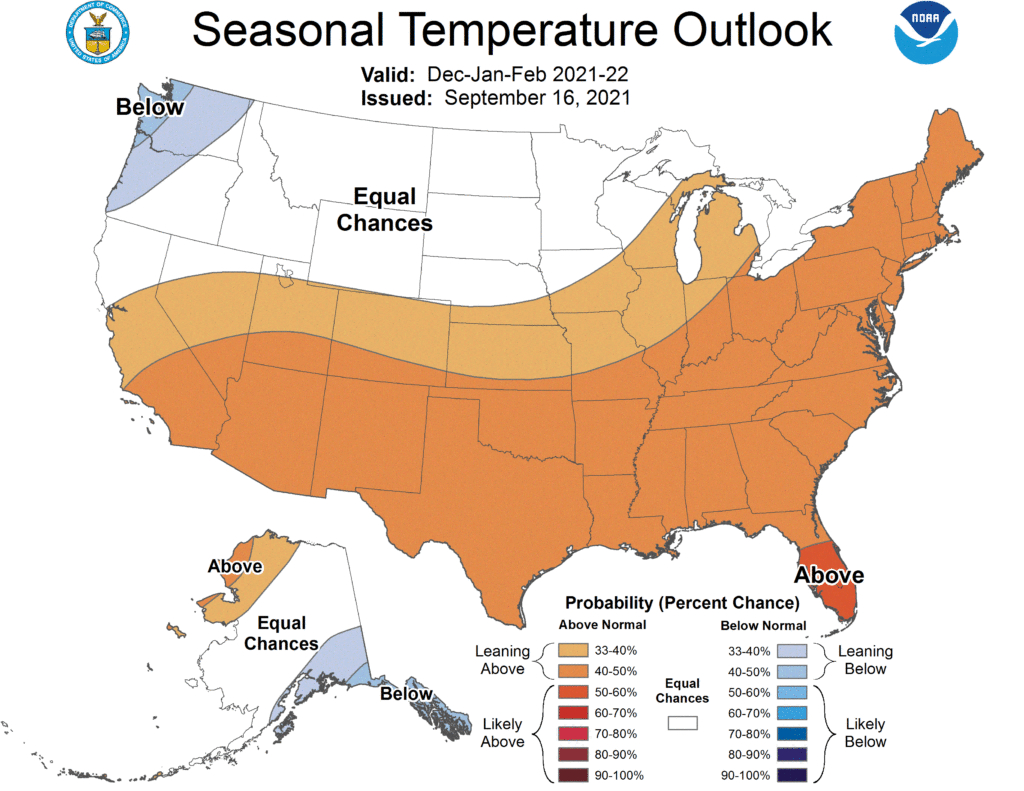
Essentially, the NOAA winter forecast predicts above normal temperatures for most of the United States, and especially southern and eastern parts of the country. In terms of precipitation, we can expect slightly drier than normal weather for the winter months in Houston and much of Texas. It looks like it could be a snowy winter in the Great Lakes region.
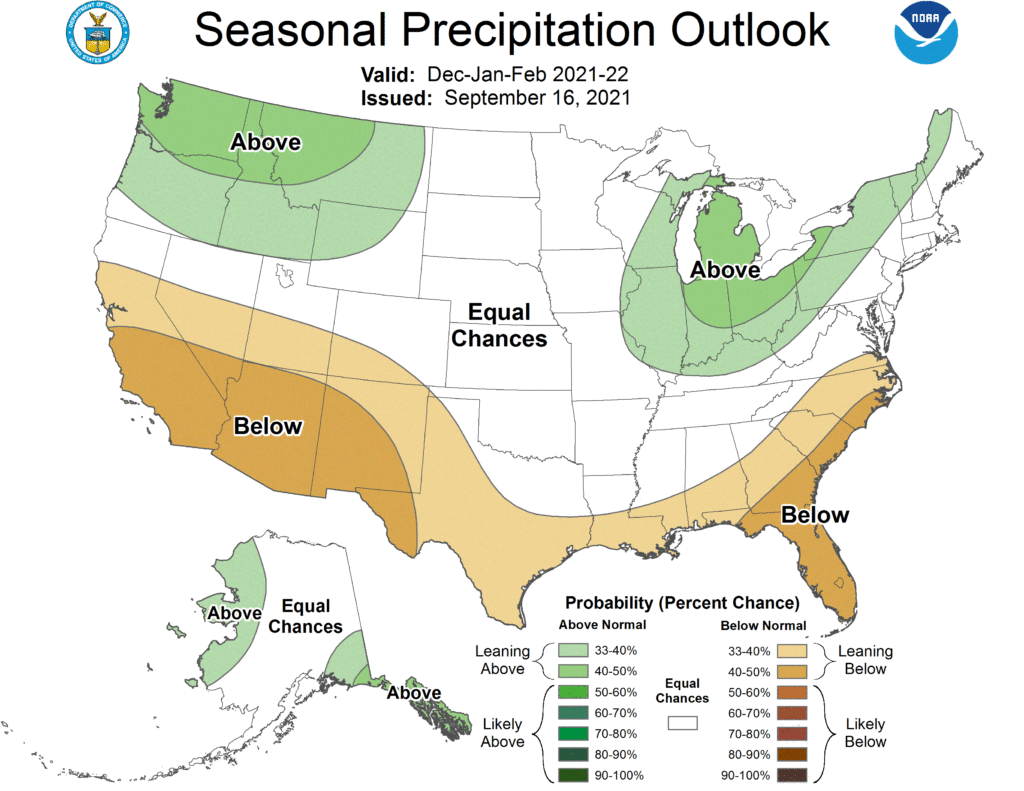
The driving factor behind these predicitons is the expected onset of another La Niña pattern this winter.
What does La Niña mean for this winter?
Forecasters are now confident that a moderate La Niña pattern will develop and persist through the winter of 2021-2022. A La Niña event occurs when sea surface temperatures in the equatorial Pacific Ocean cool below normal levels. This tends to have fairly predictable effects for North America during the winter months.
Assuming a moderate La Niña develops, this typically places the jet stream a bit further north across the United States than normal. This positioning tends to bring fewer storms and fronts into Texas during the winter months, and accordingly we would expect a Texas winter to be warmer and slightly drier than normal.
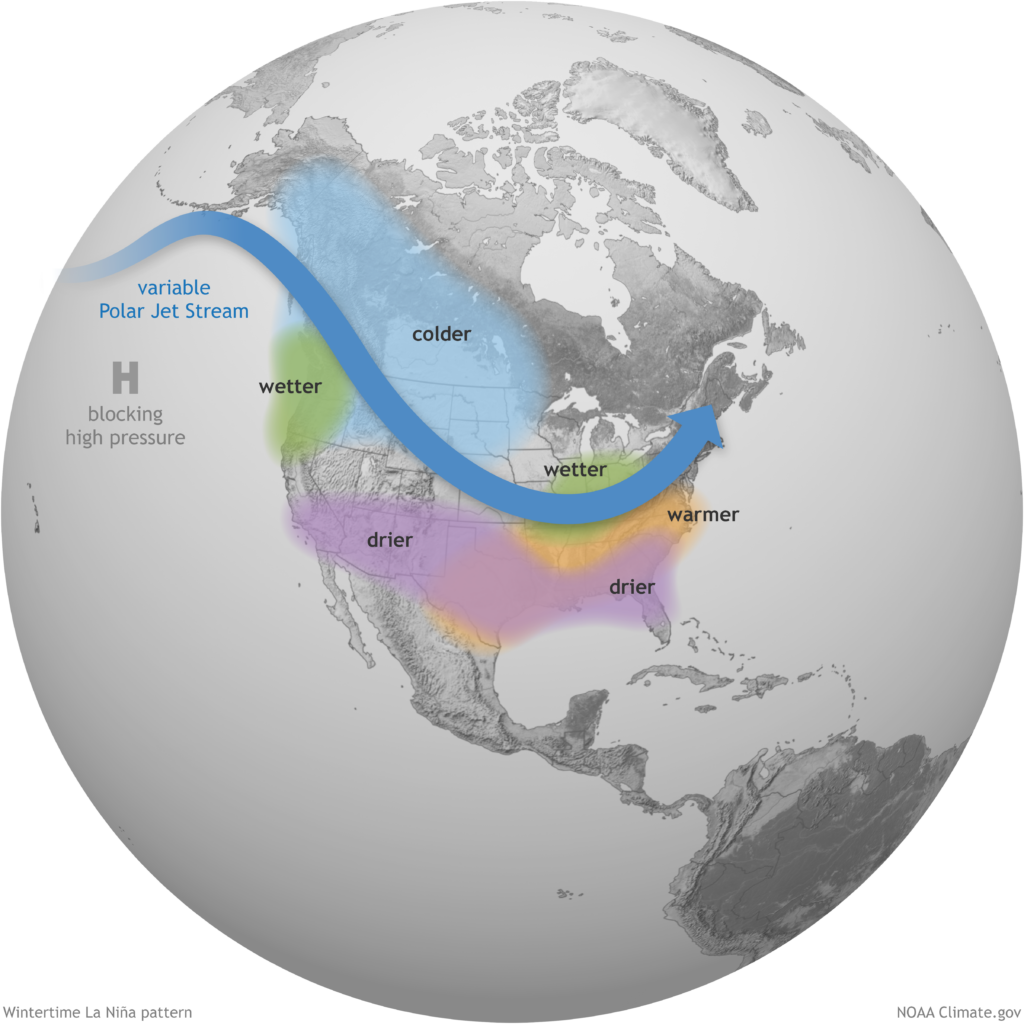
That, of course, is the typical pattern. Sharp-eyed readers may recall that a La Niña pattern was also in place during last winter. So how, exactly, should we feel about that in the context of another super hard freeze this coming winter?
How likely is another February 2021-type freeze?
While nothing is ever certain in life, particularly with respect to weather, the odds of having a similar event to the February freeze in the following winter is very low in Houston. And the odds are no higher than they are in any other given winter. Back just before the cold set in, Matt wrote a post about historic Houston freeze events. The post touched on similar longer-duration cold snaps that occurred in 2018, 2011, 1989, 1983, 1978, 1951, 1940, 1930, 1899, and 1895. None of those occurred in back to back winters.
If we want to take a more rigorous statistical approach, we can crunch some more numbers. Back in February we had official low temperatures of 16° and 13° on the 15th and 16th. So let’s look at all winters that saw back to back low temperatures of 19° or colder.
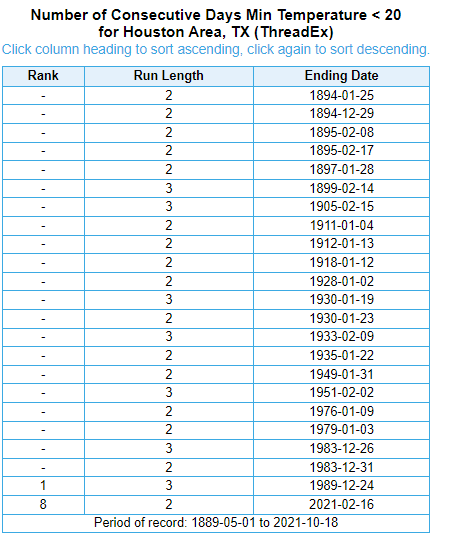
It has not happened in back-to-back winters since January 1911 and January 1912. Prior to that, it also happened in the 1893-94 and 1894-95 winters. Again, nothing is ever certain, but history is more than likely on our side here.
Do summer hurricanes lead to winter snow?
One of the most common winter forecast refrains I’ve heard since moving to Houston in 2012 is that if we have a hurricane in summer, we almost always have snow in the subsequent winter. 2021 saw us get hit with Hurricane Nicholas, so obviously that means we should get ready for an 1895-style snowball fight, right? In words of the great philosopher Lee Corso, “Not so fast my friend.”
Let’s be somewhat generous and define “hit by a hurricane” as a year in which a hurricane passed within 125 miles of downtown Houston (Editor’s note: Because we are using this strict definition, 2017 was omitted, as Harvey was *not* a hurricane within 125 miles of Houston. It was a tropical storm at that point.) Prior to 2021, 33 hurricanes have met this criteria since 1895. If we match those years up with years that saw snow in Houston (via the old Weather Research Center’s excellent list), we can see what years saw snow after a hurricane hit. So let’s do exactly that. A couple notes about this: First, just because “Houston didn’t see snow,” it doesn’t mean it didn’t snow in some outlying portions of our area. “Houston” sprawls pretty far out, but in order to do this, we need to meet some kind of definition. Second, you may notice a discontinuity between the list of hurricane years and snow years if you try to do this yourself. Just remember that if a hurricane hit in 1983, we had to see snow in the winter of 1983-84 for it to qualify. Incidentally, we didn’t, though we had a pretty memorable freeze that winter. Also, some years saw multiple hurricanes, such as 1989, 1971, and 1934.
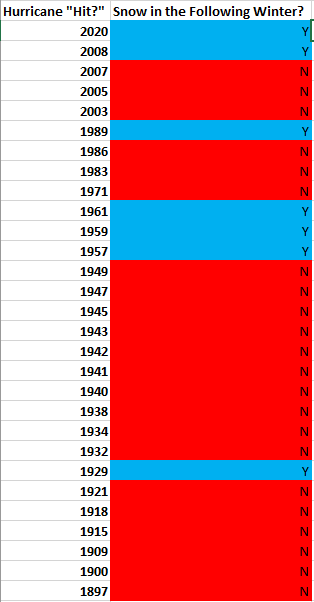
Since 1895, the data (plus 2021) suggests Houston has seen snow in 23 percent of all winters, hurricane or no hurricane. Based on the hurricane data, seven out of 30 winters following a hurricane hit since 1895 have seen snow, placing our odds at—wait for it—23 percent. The takeaway? It’s fun to say that Houston sees snow in winters following a hurricane. The statistics say that is false, and the odds of snow in a post-hurricane winter are perfectly identical to the odds of snow in any other winter.
We’re just the messengers, but please feel free to yell at Matt if and when it snows this winter.
We also saw snow following Harvey, although that didn’t qualify for the “getting hit by a hurricane” since it wasn’t within 125 miles of downtown. Arguably should be included here though. So in the recent past, the percentage appears inflated.
I enjoy Space City Weather so much, it’s one of the highlights of my day 🤣
Today’s was that much more enjoyable and informative. We are lucky to have Eric and Matt in Houston.
You guys are a Houston staple like NASA and Mattress Mack 😂
My bet is we will see snow….. even though statistics say it’s only 23% of the time.
What about the significant snowfall all afternoon and evening of December 24, 2004? That was pretty memorable, although I don’t remember whether we had a hurricane come through that summer. I’ve always heard that if we have a really active hurricane season (particularly any big storm hitting our part of Texas), then that means snow the following winter, but the statistics on that are likely similar to what you’ve said in this post. In other words, it’s anecdotal and (depending on your point-of-view) possibly fun to think about, but the numbers don’t necessarily add up.
I was going to suggest that Harvey counts as a big storm hitting Houston, and we had two snow days that winter. Allison in 2001 wasn’t a hurricane but was also a big storm to hit Houston. Does anyone else remember if we had snow that following winter? (I don’t.) I know we also had some kind of snow/ice day at least once every winter for the years 2004-2008, with the exception of the winter of 2005-2006. But I was living in the suburbs then, and maybe the snow/ice didn’t make it into Houston proper some of those times.
SCW ought to include hurricanes AND tropical storms in the chart. 2020 was included because of Laura, not Beta, but Beta was the one that really affected Houston.
I’m just wondering how we will rely on historical data as predictors of today’s weather patterns as global warming occurs and changes our overall climate. We’ve seen such extremes lately here and around the world. It’s something to consider. Matt and Jeff – would be good to hear your thoughts on that in a future post.
Enough with the FUD
Didn’t Alicia hit on 1983?
Yes
Aug 5, 1983 is my recall
I moved to Houston exactly 7 days after Alicia. I was a senior in high school. My dad took me on a tour of the city and all the devastation.. I asked my dad why we were moving to a place like this.
I remember all the freezes from 1976 to 2021. But then all the freezes fell during holidays.
What about Harvey and Allison?
My recall says TS Alison gave us a 5 day, below 20 degrees, between Christmas and New Years Day. Pipes froze and then thawed when people were not home. But my memory does fade sometimes.
Interesting criteria for the snow/hurricane comparison. I wonder why you chose 125mi of downtown. That seems very generous, but maybe in meteorological terms, it’s not too much. I wonder what the comparison would be if you included hard freezes as well. I suppose that data is easy to look up ourselves. It’s interesting to see the actual data, though. Thanks for answering the question.
I also wonder if we included significant tropical storms such as Harvey and Allison in this, which I notice are missing.
TS Claudette July 25, 1979, 44” of rain in 22 hours, and a subsequent rain event September 19, 1979, of no name but 21 inches in 24 hours, gave us a very ‘hard freeze’ February 1980.
space city weather is as clutch as it gets
Great reading and thanks for the historical data and the look ahead. And, it’s “science” not a railroad train schedule, so anything can, indeed, happen. These are “seasonal outlooks” based on historical data: “if this, then generally that”. Actually, last year, except for three days in February, we did have a pretty “above average” year in temps and “below average” year in precipitation…NOAA probably calls that a “win”. The Farmers Almanac says we are in for another round of bitterly cold weather in late Jan/early Feb. Here’s the thing, Houston winters aren’t all that rough (last year excepted and if the lights had stayed on, it would have been a blip). Cool to occasionally cold that might get some vegetation. But, back-to-back harsh winter events? I can’t remember any.
Not only is it too hot here in summer, it’s getting to be too hot in the winter too. Lows in the low 60s and highs in the low 80s do not make for a winter.
Looks like I will have to travel again this year to see snow. Couldn’t last year.
Well-meaning people from other parts of the US often ask, “Why do you live in Houston?” Space City Weather is one of my reasons! I feel sorry for residents of other cities that don’t have Eric, Matt and now Maria.
Non-meteorologists disagreeing with a meteorologist regarding the non-existent relationship between hurricanes and snowfall … smh. Folks, an experienced expert literally handed you the information you need. Why balk at it? 🤦🏻♀️
Modern man is a superstitious lot
I remember the 1951 freeze. I had been given a new pair of boots for Christmas and literally skated across the street from one Grandmother’s house to the other. I also remember the drought from 1951 to 1957 that followed. I am hopeful that we do not go through that again. If will be much worse this time around.
The only thing I’m sure of is that the weather we’re having currently SUCKS.
Any thoughts on the correlation between the snow/freezes of February 1899 and 1960 and the 1900 Storm and Hurricane Carla?
Both freeze/hurricane clusters were 61 years apart. This year’s freeze was 61 years after the 1960 cold spell. I’m concerned about a major storm next September.
The Lee Corso reference cracked me up. Good one
I appreciate the Lee Corso reference. Thanks for the laugh.
What is Georgia winter weather going to look like ?
If it’s expected to be a little warmer than usual, what can we expect humidity-wise?
Fascinating data about freezing temperatures through Houston history. Interesting that two in a row occurred at the beginnings of decades (1930 and 1940), also that there was a 31 year warm winter period from 1899-1930.